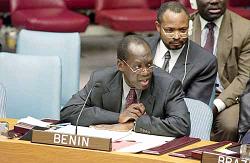UN Security Council agrees to Sudan peace mission
NAIROBI, Feb 11, 2005 (IRIN) — The UN Security Council has started working on a resolution to establish a peacekeeping operation in Sudan to support the peace process, the Council’s President, Ambassador Joel Adechi, of Benin, said.

The Council expressed “its readiness to establish, under Chapter VI [of the UN Charter], a full fledged peacekeeping operation in order to support the implementation of the 9 January North-South Comprehensive Peace Agreement”, Adechi said in a statement following a meeting of the Council on Sudan on Tuesday.
The Council discussed the implementation of the Sudanese peace agreement and a number of issues related to the western Sudanese region of Darfur in the presence of Sudanese vice president, Ali Osman Taha, and John Garang, leader of the southern Sudan People’s Liberation Movement/Army (SPLM/A).
“The Council is fully committed to taking appropriate measures which could encourage and enable the international community to do its part in supporting and consolidating the peace process,” Adechi added.
It expects a donors’ conference, to be held in Oslo in April, to help mobilise resources for reconstruction and development assistance in an effort to promote national reconciliation.
Council members, Adechi noted, remained gravely concerned by the dire situation prevailing in Darfur and called upon the parties to do their best to bring the conflict to an end quickly through a sustainable political settlement.
“African Union [AU] monitors and a number of humanitarian agencies encountered seven villages that had been totally burnt and three others abandoned as a result of violence in the past week,” Radhia Achouri, spokeswoman for the United Nations Advance Mission in Sudan (UNAMIS), said in a 9 February statement.
The Council endorsed the role the AU was playing in Darfur through its military protection and observer mission and called on all parties to cooperate fully with the AU to ensure its freedom of movement and safety in the entire region.
Meanwhile, Wendy Chamberlin, deputy high commissioner of the UN refugee agency (UNHCR), will leave on Saturday for a week-long trip to southern Sudan, Uganda and Kenya, where she will look at UNHCR’s initial efforts to lay the groundwork for the anticipated return of refugees to southern Sudan.
“UNHCR is trying to prepare the ground in south Sudan by implementing community-based programmes in the fields of water, health and education,” Mohammed Dualeh, operations manager for UNHCR in South Sudan, told IRIN on Thursday.
“By and large, Sudanese refugees are willing to return, but they are wary of the social situation in their home towns, which is why we are making these areas more conducive to return,” he added.
Lack of infrastructure and basic services in southern Sudan after decades of conflict meant that major investment was needed to rehabilitate communities before such returns could begin, he said.
UNHCR was preparing for anticipated returns by registering Sudanese in neighbouring countries who want to go home, pre-positioning the necessary supplies, and running landmine and HIV/AIDS awareness campaigns. It has opened three offices in the south – in Rumbek, Juba and Yei, and will open two more soon, in Yambio and Kajo Keji, on the border with the Democratic Republic of Congo (DRC) and Uganda, respectively.
“We are expecting substantial population movements by the second half of 2005, in particular from the DRC, CAR [Central African Republic], Uganda and Kenya,” Dualeh said.
Some 223,000 refugees from southern Sudan are in Uganda, 60,000 in Kenya, 88,000 in Ethiopia, 69,000 in the DRC, an estimated 36,000 in the CAR and 30,000 in Egypt. The conflict in the south has also displaced an estimated 4 million more people within Sudan.
The war between the SPLM/A and the Sudanese government in the south erupted in 1983 when the rebels took up arms against authorities based in the north to demand greater autonomy. The fighting has killed at least two million people, uprooted four million more and forced some 600,000 to flee to neighbouring countries.
In Darfur, tens of thousands of people have been killed and about 1.85 million displaced from their homes. The UN has described the Darfur conflict as one of the world’s worst humanitarian crises.
